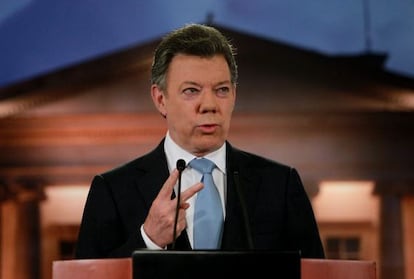Colombian president confirms dialogue has been opened with the FARC
"We will learn from mistakes that were made in the past," says Santos

Colombian president Juan Manuel Santos on Monday officially announced the beginning of "exploratory conversations" with the Revolutionary Armed Forces of Colombia (FARC) to seek an end to a 50-year-old armed conflict with the violent Marxist-Leninist group.
"From day one of my administration I have fulfilled my constitutional obligation of seeking peace. With that goal in mind, exploratory conversations with the FARC have taken place to find an end to the conflict," Santos said in a broadcast address.
The president's statements ended a news-heavy day that began with a report on Telesur, a television station with sympathies for Venezuelan leader Hugo Chávez, that provided details about a peace negotiation between the government of Colombia and the guerrillas. The FARC, whose activities include drug trafficking, the use of child soldiers and kidnapping, are considered a terrorist organization by the European Union, the United States and other countries.
The Colombian president spoke for just a few minutes on Monday, during which he confirmed that the news story was true. "I want to clearly manifest to Colombians that contact has been made." Later he said that future conversations with the FARC would be guided by the following principles: "First, we will learn from the mistakes of the past so as not to repeat them. Second, any process must lead to the end of the conflict, not to its extension. Third, military operations and a military presence will remain over every square centimeter of the national territory."
This means there will be no demilitarized zone in which to hold talks, as there was in 1999 when then-president Andrés Pastrana cleared an area the size of Switzerland of military personnel in the jungle territory of Caguán. In February 2002, Pastrana himself declared the attempt at peace talks terminated. The next president, Álvaro Uribe, intensified action against the FARC.
The process will begin on October 5 in Oslo, Norway, a country that has apparently been involved in the conversations. The governments of Cuba and Venezuela are also reported to be involved.
Another former president of Colombia, Ernesto Samper, said that he was happy to hear the news and also pointed out that two laws created under President Santos, the Land Devolution Law and the Victims Law, have created "a friendly environment" in which the guerrillas will sit down and talk.
But Uribe expressed disappointment, and said that to talk with the guerrillas is to talk to terrorists. In his opinion, the only alternative is military annihilation of the FARC.
President Santos went even further in his address to the nation and talked about a possibility of also sitting down to talks with the Ejército de Liberación Nacional (ELN), the second biggest guerrilla group in the country.
"Additionally, today the ELN has told an international news outlet about its interest in participating in conversations aimed at bringing an end to violence. To this guerrilla group, I say that, within the framework of these guiding principles, they too could be part of this effort to end the conflict," he said.
Santos suggested that prudence will be one of his tools to bring the talks forward. "In the coming days we will know the results of contact with the FARC. Colombians can fully trust in the fact that the government is acting with prudence, in earnest and with firmness, putting the welfare and the peace of mind of all the citizens of our country first and foremost."
Tu suscripción se está usando en otro dispositivo
¿Quieres añadir otro usuario a tu suscripción?
Si continúas leyendo en este dispositivo, no se podrá leer en el otro.
FlechaTu suscripción se está usando en otro dispositivo y solo puedes acceder a EL PAÍS desde un dispositivo a la vez.
Si quieres compartir tu cuenta, cambia tu suscripción a la modalidad Premium, así podrás añadir otro usuario. Cada uno accederá con su propia cuenta de email, lo que os permitirá personalizar vuestra experiencia en EL PAÍS.
¿Tienes una suscripción de empresa? Accede aquí para contratar más cuentas.
En el caso de no saber quién está usando tu cuenta, te recomendamos cambiar tu contraseña aquí.
Si decides continuar compartiendo tu cuenta, este mensaje se mostrará en tu dispositivo y en el de la otra persona que está usando tu cuenta de forma indefinida, afectando a tu experiencia de lectura. Puedes consultar aquí los términos y condiciones de la suscripción digital.








































